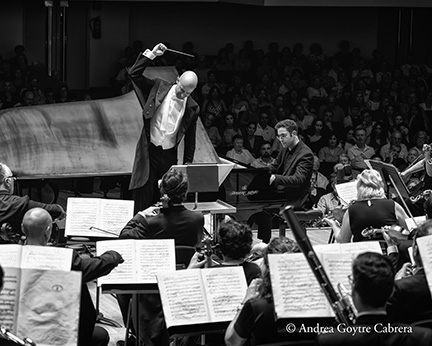The '4th Shigeru Kawai International Piano Competition,' held from July 29 to August 6, showcased remarkable talents. In this article, we trace the journey of one of the six finalists, Kazusa Sagawa, through performance videos and an exclusive interview.
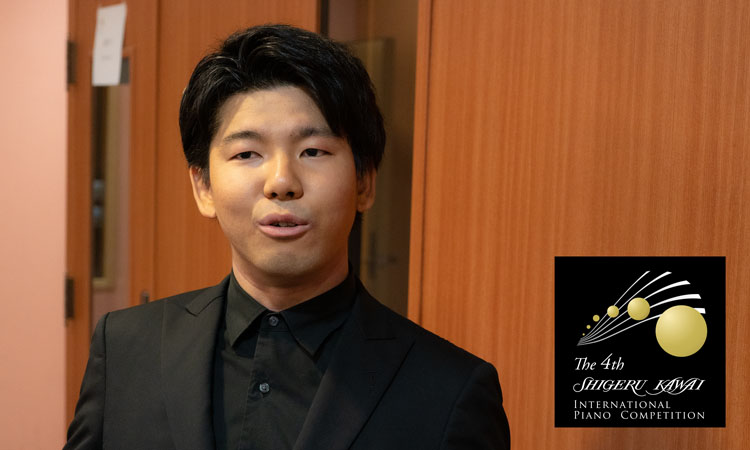
Contents
Program
1st Round
J. Brahms / No.1 Capriccio in D minor from "7 Fantasies Op.116"
J. Brahms / No.2 Intermezzo in A minor from "7 Fantasies Op.116"
J. Brahms / No.3 Capriccio in G minor from "7 Fantasies Op.116"
J. Brahms / No.7 Capriccio in D minor from "7 Fantasies Op.116"
A. Grünfeld / ”Soirée de Vienne” Concert Paraphrase from Strauss' Waltzes from Die Fledermaus and others Op.56
Semifinal Round
F.J. Haydn / Piano Sonata in B minor Hob.XVI:32
C. Debussy / Feux d'artifice from "Preludes Book 2"
R. Schumann / Carnaval "Scènes mignonnes sur quarte notes" Op.9
Final Round
L.v. Beethoven / Concerto for Piano and Orchestra No.4 in G major Op.58
Interview
After the Semifinal Performance
Please share your thoughts immediately after finishing the semifinal round.
Well, in the semifinal, I performed pieces by Haydn, Debussy, and Schumann. I chose works that had a variety of characters to showcase my strengths and opted for composers from different eras, rather than focusing on a specific period. Today, I feel that I was able to express myself well through these choices.
How did you choose the repertoire for the first round, semifinals, and finals?
The first round, with its limited time of 15 to 20 minutes, required me to create a lasting impression on the audience. For my free-choice piece, I decided to play a piece that's like an encore, which is Fritz Kreisler's "Die Fledermaus" paraphrase by Grünfeld. It's a piece I'm confident in and enjoy performing. As for the Brahms piece, which was the set piece, it's a composition I've been studying for a long time, so I felt quite comfortable with it.
In the semifinals, I centered my program around Schumann's "Carnaval." Although I prefer classical composers to Romantic ones, I wanted to include a sonata. Sonatas, with their relatively smaller number of notes, can expose a performer's technique quite starkly, so I was a bit apprehensive. However, I managed to perform it calmly and confidently.
"Carnaval" is a large-scale piece featuring a multitude of characters, so I included Debussy's "Feux d'artifice" before it. In my mind, I programmed it to create associations between fireworks and the festive atmosphere of "Carnaval."
For the final round, I wanted to play something from the classical period and chose Beethoven's Concerto No. 4. While many competitors in finals tend to select virtuosic and romantic pieces, I wanted to convey my musicality and tonal qualities more directly, which is why I opted for Beethoven.
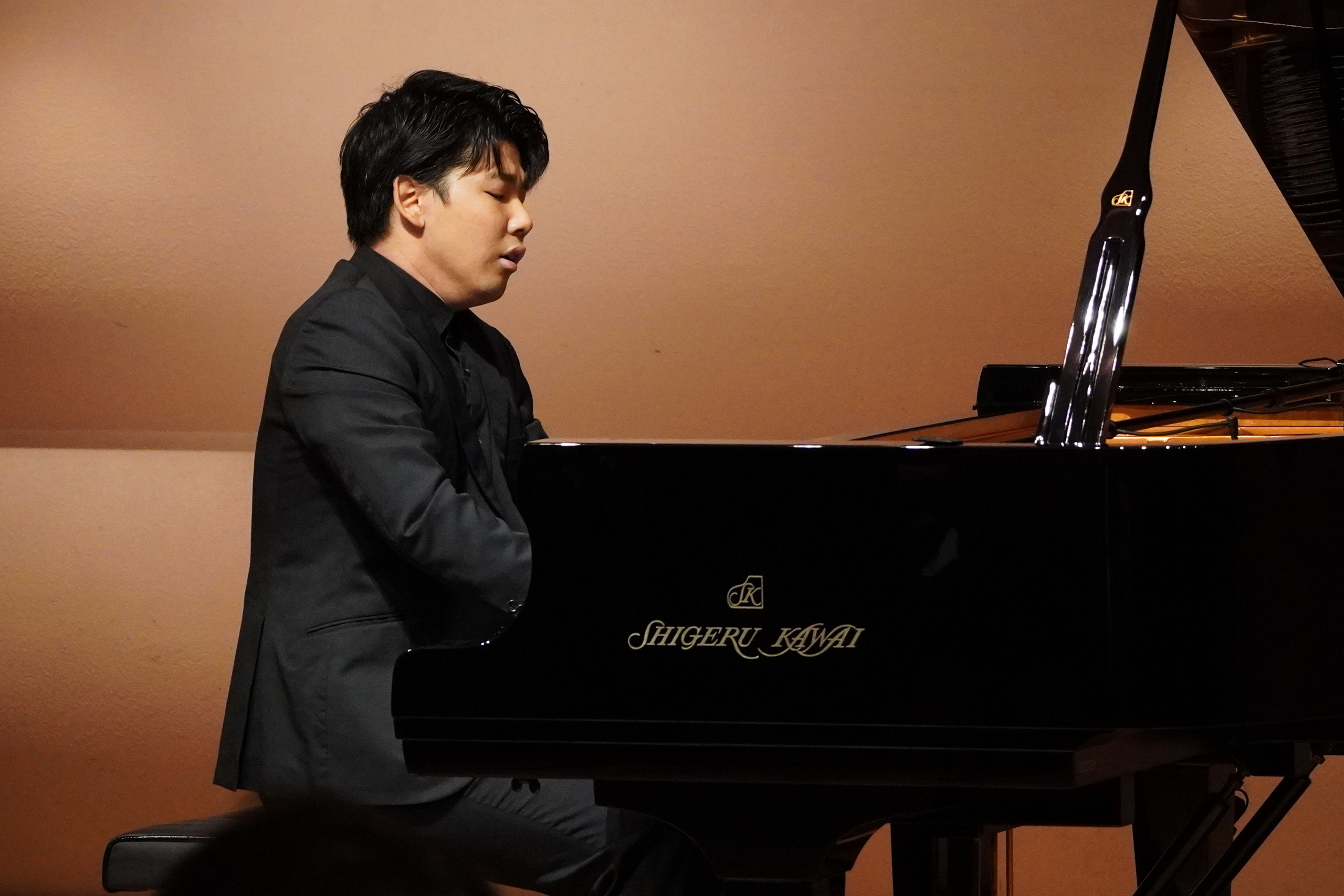
©Shigeru Kawai International Piano Competition
After the Announcement of the Finalists
Congratulations on making it to the finals! Can you please share your thoughts right now?
When I finished playing in the semifinal, I had a feeling like, "Maybe I could advance to the next round?" So, receiving positive feedback from the judges was incredibly gratifying!
After the Final Performance
Please share your current feelings.
Being with Professor Nersessian, who handled the orchestral part of the accompaniment, made me feel like "I'm not alone," which was reassuring. However, for some reason, I felt the most nervous in this round compared to the previous ones, and I became quite tense being the first performer. As the movements progressed, I started to warm up, and I feel like I was able to express more of my own musicality.
The hall was close, and there were many people, so I was considering various aspects like resonance, sound balance, etc., while performing. Overall, I think I was able to play while keeping those considerations in mind.
How was the "Concerto for Two Pianos," which is a distinctive feature of this competition?
In the final round, it is common to perform with an orchestra and present a concerto. However, when it comes to two pianos, the meticulous coordination and the ability to directly convey each nuance and breath make playing with two pianos a more intimate process, allowing for the creation of music in a tighter collaboration compared to performing with an orchestra.
Personally, in situations like academic exams or when practicing concertos, I've had many opportunities where others played the orchestral parts. In that regard, I was already accustomed to (playing with) two pianos. Thanks to the excellent accompaniment, I believe my interpretation of Beethoven has improved.
How was it to perform with Professor Nersessian?
Originally, I thought about performing a concerto by a Russian composer for the collaboration with the Russian professor. In fact, before the competition was postponed, I had chosen Tchaikovsky's concerto as part of my repertoire. However, considering the significant importance I currently place on studying Beethoven's work, I decided to select this piece to study and perform with my professor.
Throughout rehearsals, Professor Nersessian provided valuable advice, sparking additional inspiration. Given his wealth of experience, especially in orchestrating beautiful sounds, he made the challenging task of reproducing the orchestral timbre with a single piano seem much more achievable. It was truly a wonderful and enriching experience.
The venue changed from the first round to the semifinals. Did you feel any differences?
There were indeed significant changes. Firstly, the piano itself was different from the first round and the semifinals. The condition of the piano and my own condition played a role, but when it comes to performing in a hall, I was very conscious of the need to convey the music clearly from the softest to the loudest passages, even to the farthest corners of the audience. The ceiling in this Sakura Hall had a box-like design (the ceiling didn't slope upwards from the front seats, but remained at the same height throughout), so I had some concerns about how the sound would reach the second floor seats and beyond.
I was performing Beethoven, a composition with fewer notes compared to Romantic pieces, so I focused on making each note clear, trying to imagine that it reached the back of the hall. As I played, I continuously worked on improving and refining these aspects, and I believe I was able to deliver a solid performance. It's truly a magnificent hall, and I was impressed by it.
Lastly, can you share a message for the audience who attended this competition or watched the livestream?
The Shigeru Kawai International Piano Competition is now in its fourth edition, and from the first edition onwards, it has welcomed exceptional pianists. Being able to reach the finals in such a prestigious competition is an honor in itself. Making it to the finals of an international competition has been one of my goals, and playing a concerto in front of the audience was a fantastic experience.
In today's age, live streaming competitions have become quite common, allowing people who couldn't attend in person to listen from anywhere. I believe this has helped more people become acquainted with my music, and I am delighted that I could share my musical expression with a broader audience.
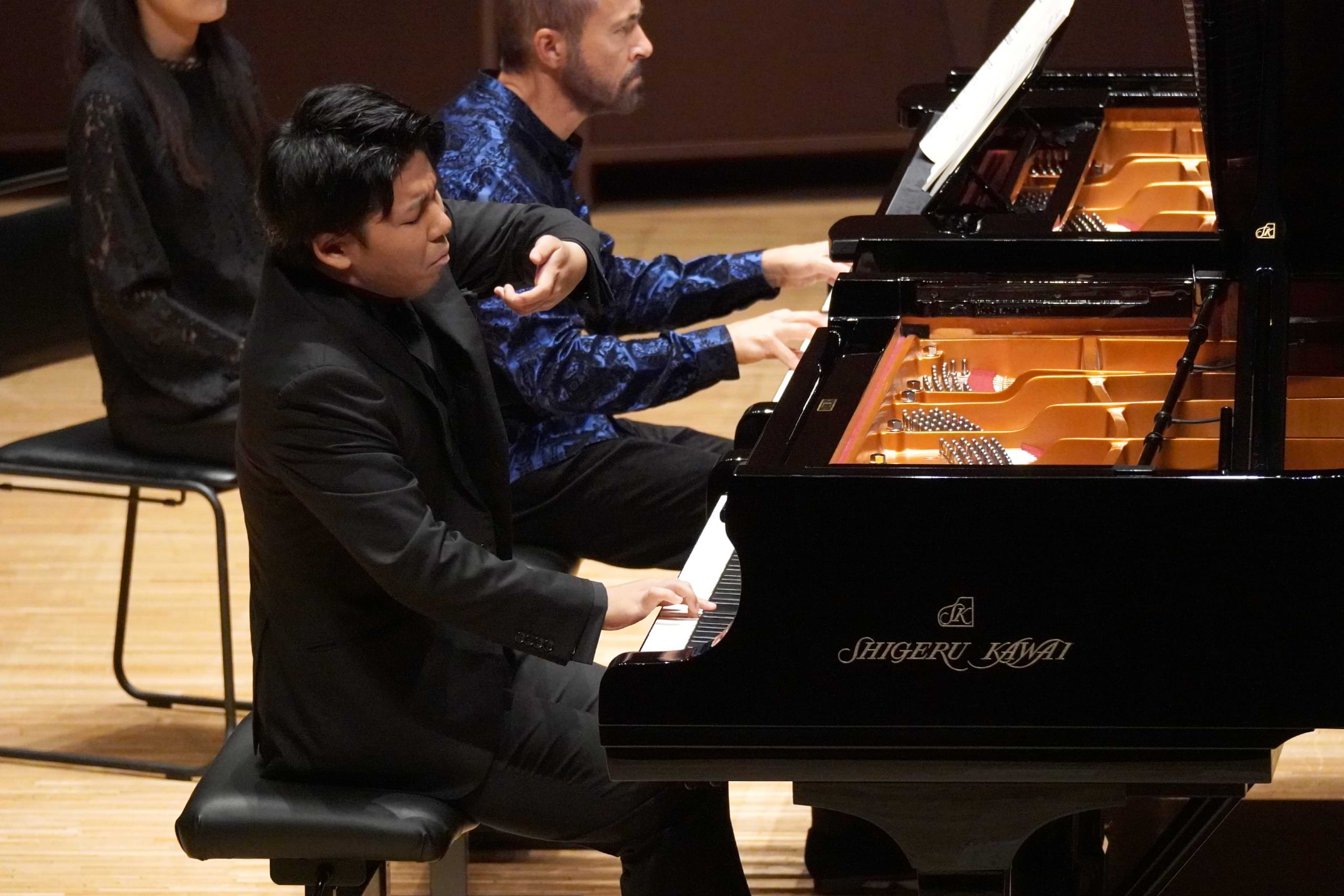
©Shigeru Kawai International Piano Competition
After the Award Ceremony
How are you feeling right now?
The schedule was quite challenging, spanning one week, but I'm extremely grateful to have made it this far. One of the highlights of the SK Competition is the opportunity to perform with a distinguished Russian professor and the orchestra in the final round. I was overjoyed that this dream came true. Advancing to the finals allowed me to play my beloved Beethoven, and receiving recognition for my performance was truly heartwarming.
Can you share your impression of the Shigeru Kawai piano?
It's interesting to note that my very first piano recital took place at Kawai Omotesando Concert Salon "Pause," as part of a series organized by Tokyo Music University. Although I've had numerous opportunities to play on Shigeru Kawai pianos before, performing at Pause in Omotesando always holds a special place in my heart. The piano there is exceptional, and it has been a significant support for my performances. I look forward to playing on Shigeru Kawai pianos more in the future and striving to improve myself even further!
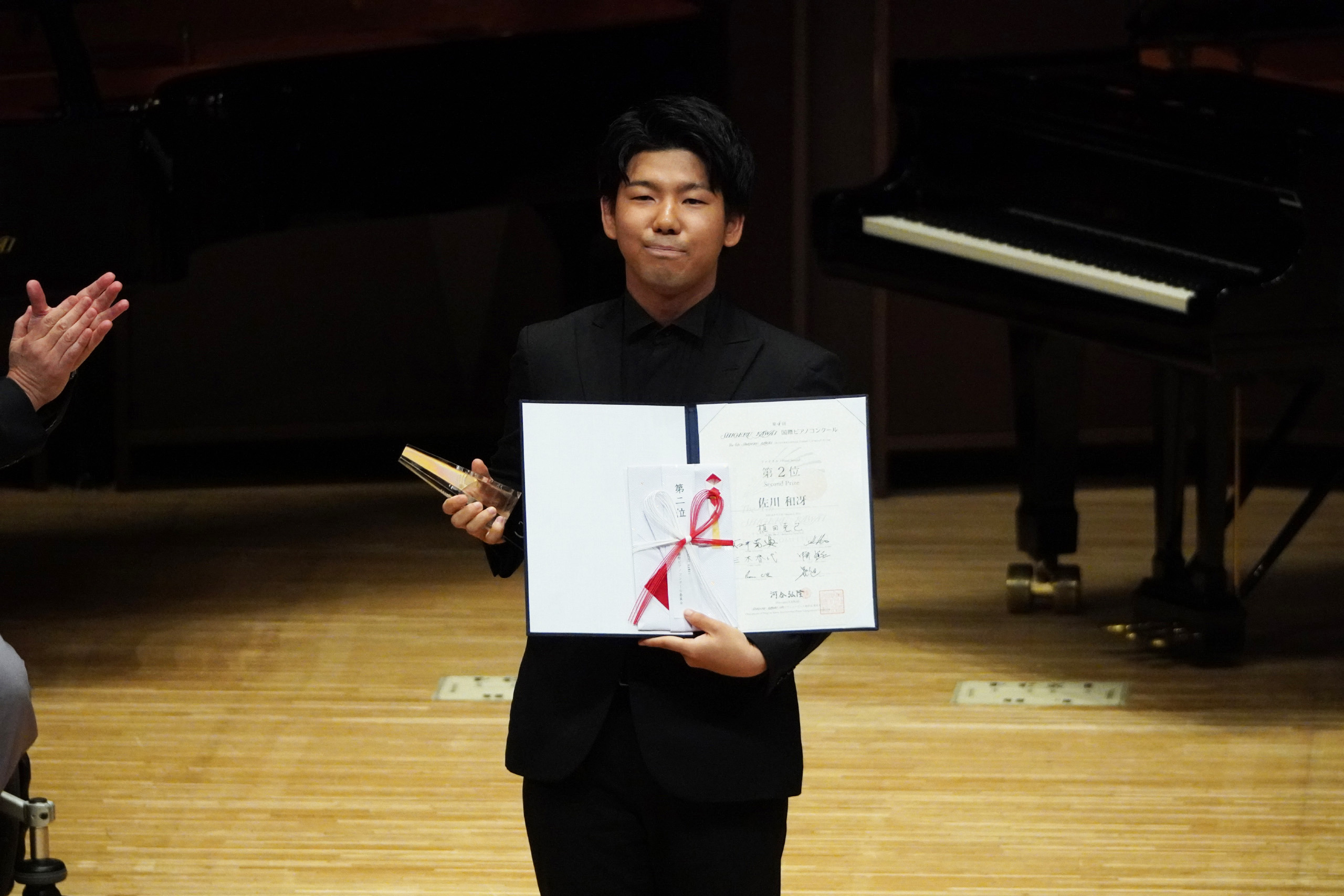
©Shigeru Kawai International Piano Competition
Before the Prize Winner’s Concert
A day after receiving the award, please share your thoughts.
I haven't had a good night's sleep yet, so I don't quite feel like it's the morning after. I believe the real sense of the outcome will settle in if I can deliver a performance tonight at the Gala Concert that makes people think, "This person deserves the second place." I've been treating it like a competition until today, so I still have my guard up and don't feel completely at ease.
How was the Shigeru Kawai International Piano Competition?
It was an absolutely fantastic competition! The overall organization was incredibly well done, and everything from the hotel to the concert hall was perfect, making the 10 days very enjoyable. The pianos provided were outstanding as well. This experience was refreshing for me, and I can only describe it as truly wonderful.
It's great that the competition was live-streamed. Lately, more and more competitions have been live-streamed, and it's interesting to see what people have to say on platforms like X (Twitter) after my performance. I couldn't help but do a bit of self-searching to see how my performance was received by the general audience.
While the COVID situation has been improving, for a while, it wasn't possible to have direct interactions with the audience to hear their feedback after performances. During this period, I had to rely on my own belief in my abilities. In that sense, receiving the Audience Award this time is especially meaningful to me. It's not only because of the judges but also because it shows that the general audience appreciated my performance.
Although I haven't participated in many international competitions before, even though this one was held in Japan, it attracted participants from abroad. In the finals, three of us were from different countries, which allowed me to deepen my connections and exchange experiences. I'm glad I had the opportunity to gain various insights, and I look forward to meeting new people in different settings in the future.
Can you share your impressions of the SK-EX piano, your first encounter, memories of playing it for the first time, and its tone, etc.?
In my program, I chose pieces that were more vibrant and bright rather than lyrical, and they resonated exceptionally well with the SK-EX. The SK-EX piano itself has an inherently dazzling sound, and it's a pleasure to play, making my performance sound even better than my usual ones. Having spent a lot of time playing Shigeru Kawai pianos, I was able to perform on the final stage without any regrets.
The SK-EX has been both a source of support and a platform for discovering new aspects of myself, making it a truly rewarding experience.
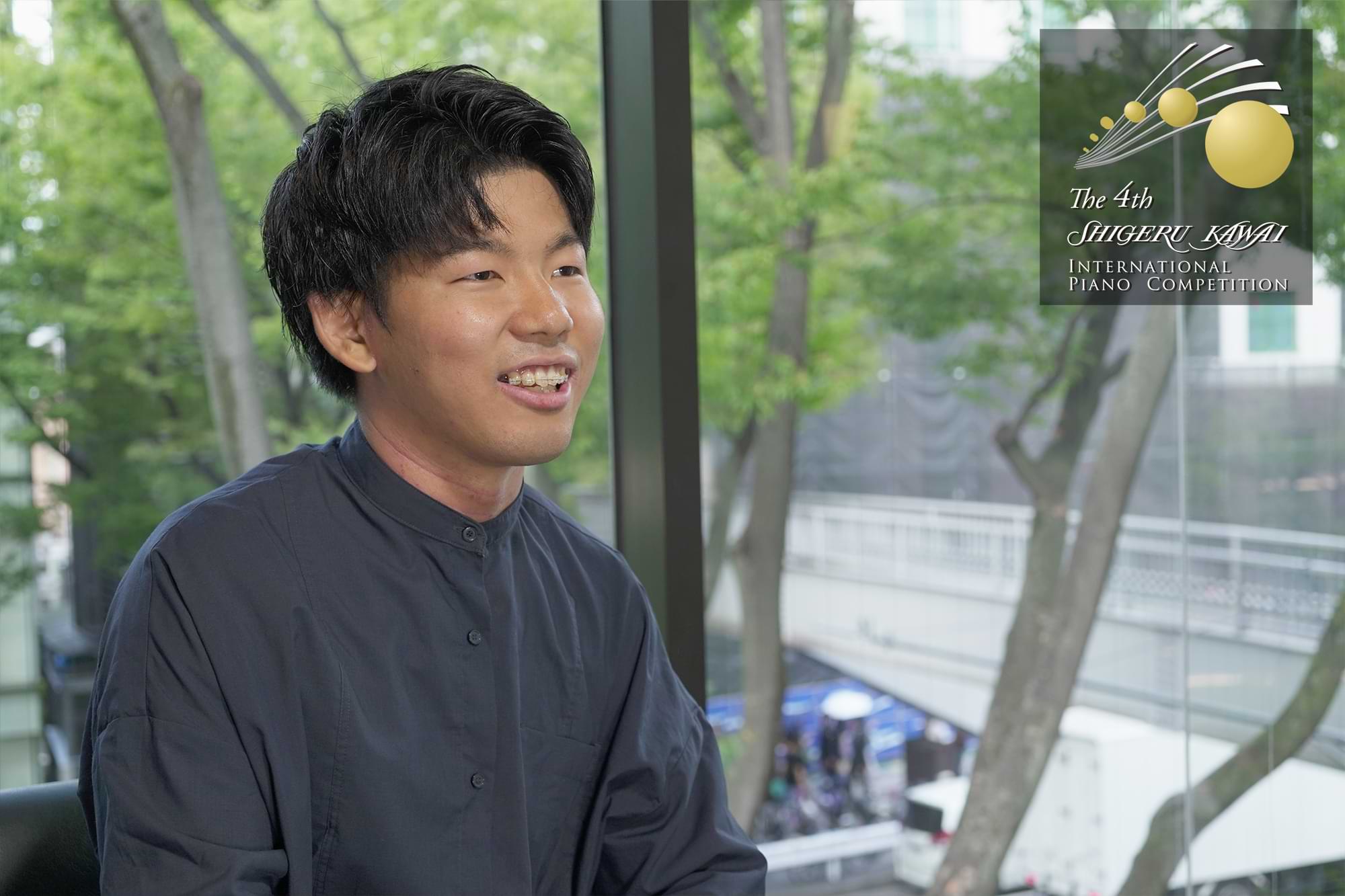
About Kazusa Sagawa
Mr. Sagawa was born in Saitama Prefecture, Japan in 1998. He graduated at the top of his class from the Tokyo College of Music and also completed his master's degree at the same institution with top honors. He achieved first place in the piano division of the 21st Tokyo Music Competition and received second place, along with the Audience Award, in the 4th Shigeru Kawai International Piano Competition. Additionally, he secured second place in the piano division of the 90th Japan Music Competition, first place in the 31st Takarazuka Vega Music Competition, the highest position in the 15th Japan Performers Competition, and became the youngest ever to clinch the first place in the 15th Tokyo University of Music Competition.
In 2018, he received the award at the 39th Kirishima International Music Festival. As a short-term exchange scholarship student at the Tokyo University of Music, he studied at the Moscow Conservatory in Russia. He also received the Most Promising Award at the Villa Sandra Piano Academy in Italy and honed his skills at events like the Chetham's International Piano Summer School in the United Kingdom and the Hamamatsu International Piano Academy.
He gained acclaim for his performance at the Tiara Koto Regular Concert organized by the Tokyo City Philharmonic Orchestra, and he has collaborated with orchestras such as the Tokyo Symphony Orchestra and the Tokyo Philharmonic Orchestra.
Currently, he is enrolled in the graduate school of the Tokyo University of Music, studying under Katsunori Ishii and Masataka Takada. In addition to his studies, he serves as a part-time research fellow.
Official X(Twitter): https://twitter.com/KazusaSagawa_pf
Official Instagram: https://www.instagram.com/kazusasagawa_pf

Writer
Kawai Japan (Domestic division)
This article has been translated from a piece published on the Kawai Japan website.
This article has been translated from a piece published on the Kawai Japan website.
